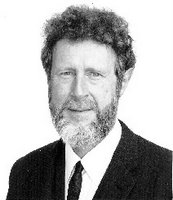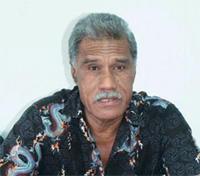China is not generally popular with today's NZ left-especially the younger set. There is something about China being a militaristic dictatorship and mass violator of human rights that even many Marxists cannot stomach.
One who can, however, is Alistair Shaw, easily one of this country's most committed young socialists.

Shaw became interested in socialism at 14, during research for a 4th form social studies project.
By the late '80s, he was mixing in the radical set at Auckland University, working on the student paper "Craccum" and getting involved in student politics.
In 1990/91, Shaw served as treasurer to the Auckland University Students Association (AUSA).
In 1991, Shaw stood on an openly left wing ticket with Julian La Valette, Richard Cornes and Robert Bennett. At the time he was in his 5th year at university, hoping to finish a BA in economics and an Llb in 1992.
Through most of the '90s, AUSA student politics were dominated by members of the Radical Society (Radsoc).
A hardcore Maoist group, supportive of Peru's "Shining Path" guerilla movement, Radsoc was plugged into the leftist network influenced by former members of the Workers Communist League and their sympathisers.
This network included the NZ University Students Association (NZUSA), Peace Movement Aotearoa (PMA) and the Aotearoa Youth Network(AYN).
Shaw was involved in Radsoc at Auckland and continued his membership when he moved to Wellington in 1993.
That year, Shaw was Wellington contact for the AYN, a member of the PMA Working Group and vice President of NZUSA.
He was also a member of the National Organising Group for the
Peoples Assembly, a nationwide network led by religious leftists and former members of the Workers Communist League.
During Shaw's time at NZUSA, relations were re-established with the Asian Students Association (ASA), a pan-Asian network of Maoist leaning student unions.
During 1994 Shaw was a member of Next Step Democracy Movement(NSDM)Core Group. NSDM was promoted by PMA, AYN, NZUSA and the Peoples Assembly and aimed to force national referendums on several socialist proposals. After a long battle, the group wound up after failing to gain sufficient signatures for any of their propositions.
Shaw is a great traveler, often to socialist countries. In late '94 he traveled to Vietnam, for unknown reasons.
In 1995 Shaw founded the Student Workers Advice Centre at Victoria, which was run by ex WCL and Radsoc types. He was also spokesman for the radical controlled, Victoria University Education Action Group.
Shaw was also a contact for the Victoria University Radical Society with Christina Rizos, his then partner, who had been Canterbury student president in 1994.
The same year Shaw was on the organising committee for the first "Activism in Aoteoroa" workshop, held at Moores Valley, Wellington.
The
AIA gatherings endured for several years. They were essentially designed for young radicals to learn subversive techniques from seasoned activists and foreign revolutionaries.
In 1996, Shaw was one of several Radsoc activists, serving on the Victoria student's association executive.
Radsoc affiliated to the
Asian Students Association that year and in April, Shaw represented Radsoc at an ASA meeting in Nepal. He also met Burmese students in Thailand and attended a National Conference of Student Unity in Bangladesh.
Shaw also hoped to get to Manila for a Youth Conference organised by Japanese Socialist Party (which was more radical than the Japanese Communist Party)and to extend links with the
League of Filipino Students (the student front of the Communist Party of the Philippines).
By 1996, Shaw was also a member of the Radsoc "core group", effectively the organisation's executive.
In 1997/98 Shaw served as president of the Victoria University Students Association, where he commissioned a centennial history of the association focusing on its radical tradition.

At the 1997 Activism in Aoteoroa Workshops, Shaw ran a "solidarity session" with Norman Uy Carnay (League of Filipino Students). Uy Carnay was later a leader of the Asian Students Association and a Filipino trade union activist.
In 1998, Shaw gave a paper at a conference in Portugal. He also stood unsuccessfully stood for the Wellington City Council on the leftist "Public Interest" ticket.
In 1999, Shaw was VUWSA's Office Manager, while his partner, Nikki Burrows edited the student paper, "Salient".
The same year, Shaw traveled to East Timor with another well known leftist, Tim Howard, to observe the UN supervised referendum on independence from Indonesia that paved the way for the "ex" communist Fretilin Party to come to power.
Shaw also traveled to Indonesia, at one stage bravely wearing a Lenin T shirt. In a later article in "Salient" on his trip, Shaw mentioned that president Wahid had suggested unbanning the Parti Kommunist Indonesia but had gotten no support in Parliament.
Incidentally, Abdurrahman Wahid was long suspected of coming under KGB influence while attending Cairo's Al Azhar Mosque and university.
While tutoring at Victoria's school of economics and finance, Shaw was also the student organiser for the newly founded
UNITE union, lead by ex Workers Communist League member, Robert Reid.
In 2,000, Shaw was editor of Radsoc's "Outburst" magazine. He also wrote an article on Radsoc for "Salient" No 6.
"We pledge support to the New Peoples Army, the armed forces of the Peruvian Communist Party, the troops fighting feudalism, imperialism and capitalism in Nepal, and the just struggle of the Bouganville Revolutionary Army..."In the early '00s, the remains of Radsoc became very close to NZ's pro-Chinese communist party, the "
Organisation of Marxist Unity" (OMU).
Shaw used to promote OMU's "Struggle" at the Radsoc stall on uni "Club Days", as late as 2002.
By 2002, Shaw was founding president of the leftist dominated Post Graduate Students Association, but his main interest was in things Chinese.
Shaw was a member of the Asian Studies Board at Victoria and was working on a Phd on "
NZ-China People to People diplomacy-1949/2002". He was also becoming very active in the
NZ/China Friendship Society, once a communist front, but now a communist front/cultural association. The society was founded by the Communist Party and sustained by party members Maoist activists in its early days. It was used to organise dozens of delegations to China over the years, which were invariably well stacked with communists and sympathisers.
Shaw traveled to China in mid 2003 to research his Doctorate. According to his
website;
The main purpose of my visit to China was to interview current and former Chinese participants in China's people-to-people diplomacy with other countries.
I was able to interview a broad cross-section of people engaged in people-to-people activities. These included foreigners resident in China, people involved in hosting people-to-people activities, people in leadership positions in the key organisations, and people retired from people-to-people activities.

Given their political nature, the issues I wanted to discuss could have been considered sensitive. Central to my research is the changing representation of China abroad. A common claim is that China's people-to-people activities constitute propaganda, and that foreigners engaged in them are somehow disloyal, even 'traitors', to their own countries.
Most of my interviews were conducted in Beijing. However the support of NZASIA/Asia 2000 also enabled me to travel outside of the capital to explore how the activities of two New Zealanders are remembered in present day China.
I spent a short time in Songjiazhuang, the small Hebei village in which New Zealand nurse Kathleen Hall tended the sick during what the Chinese refer to as 'the war of resistance against Japanese aggression'. Hall also helped the Communists' 8th Route Army and was described by Norman Bethune (a Canadian doctor who worked with the Communists in the late-1930s) as 'an angel'.

I also traveled to Shandan, via the capital of Gansu province, Lanzhou. These two cities are homes to schools founded by Rewi Alley, remembered in China as 'a great internationalist and social activist'. I was able to discuss Alley, his memory, and the ongoing contact between the schools and New Zealand with a number of people, including some who had known Alley personally. I spoke with school managers, local Chinese People's Association for Friendship with Foreign Countries (CPAFFC) and foreign affairs officials, and with students at the two schools.At the NZ/Cina Society's 2004 conference, Shaw, (treasurer, Wellington Branch) presented his research into NZ youth and student visits into China. He stressed the importance of involving more young people in the Society.
In 2005, Shaw became a member of the Society's executive.
























